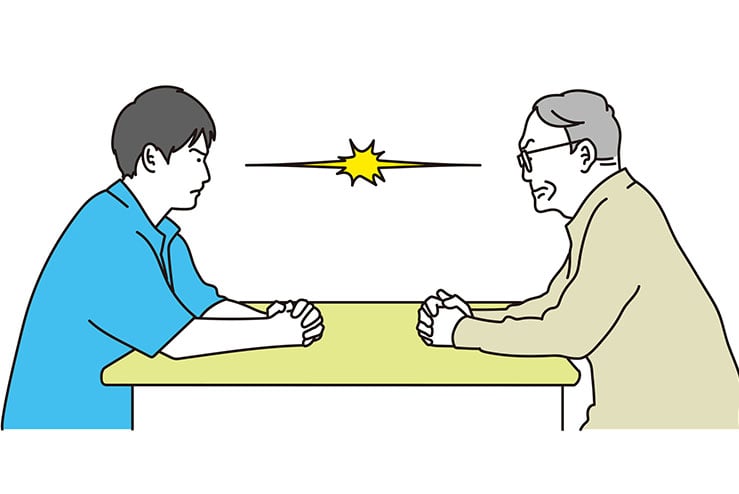Jessica Valenti wants you to excise friends and family from your life and shun strangers over the presidential election. Specifically, those who cast their votes for Donald Trump. Valenti is a feminist writer who runs a newsletter called Abortion, Every Day. The name provides you with a glimpse of her psyche.
She’s been at this for nearly a decade. In 2016, Valenti published an opinion piece for The Guardian on the same topic titled, “‘Vote shaming’ Trump supporters is fair. What they have done is shameful.” She shared it again on Tuesday in a video posted to social media, making the case for ostracizing friends and family anew. “Cutting Trump supporters out of your life is not petty or vengeful,” Valenti wrote, “it’s actually a vital social tool.” In fact, it is both petty and vengeful, which is why this sort of behavior should be avoided as much as possible.
I tend to agree that liberal democracy merely obscures the distinction between friends and enemies beneath a façade of civility. If that is the case, however, it also means we have a greater obligation not to alienate ourselves from others over politics. There will be times when this is simply impossible. Ironically, the people who probably should be cut out of your life and with whom you likely would have no choice but to disassociate from are those like Valenti—those who are so consumed by the political that they can see nothing outside of it.
That is the main thing, whether you can see people as humans apart from their politics rather than rendering them into abstractions for your own mental jousting. Some people, to be sure, cannot think of themselves outside of that context, so they naturally cannot interpret individuals apart from it either. Individuals disappear in the gathering clouds of a collective menace. People become “problems” in need of political solutions.
I think Louis Clair hit the nail on the head in his introduction to The Peace by Ernst Jünger, penned in the spirit of grace and penance by the author as a blueprint for a non-Nazi, postwar Europe. Jünger wrote it while in contact with members of the ill-fated Stauffenberg conspiracy against Hitler’s life. “Modern man has a fatal propensity for attempting to free himself of his own feelings of guilt, his own anxieties and terrors,” Clair wrote, “by projecting them onto some scapegoat, some incarnation of absolute evil, which he burdens with all the sins, all the shortcomings that he cannot face within himself.”
Clair wrote that the Nazis scapegoated the Jews; for the Stalinists, it was the Trotskyites; and, after World War II, it was “the German,” which became “a sort of corporate entity, an amalgamation of all that is hateful and despicable.”
People like Valenti do not see individuals who happened to cast ballots for Trump. She does not acknowledge a diversity of motives, anxieties, and aspirations. She sees only that the individual melts into “an amalgamation of all that is hateful and despicable.”
In contrast, there are people like Larissa Phillips.
Phillips is a lifelong Democrat living in red, rural New York. Her husband and two kids uprooted themselves from Brooklyn for life on a family farm. It did not take long for her to notice the abundance of MAGA paraphernalia in her new environment. Her neighbors were the prime enemy. Not merely bad but evil.
However, the more time she spent around these people in the flesh, the harder that view was to hold. She described her changing viewpoint in an article for The Free Press:
BQ“But nothing is constant, even political feelings. By the time Biden announced his candidacy, I’d been living upstate for 10 years. A decade of farming had made me less aloof, because farming entails emergencies, and so often my neighbors were there to help. It’s hard to care where someone stands on politics when they race to your house to save a dying lamb. When their wife helps search for your runaway dogs. When they deliver and stack 50 hay bales within hours of your asking for it, and afterward make pleasant chitchat. This is the gift of living in a rural area: I keep finding reasons to see my political adversaries as human.
And when it came time to vote in 2020, my Trump-supporting neighbor held the door of the firehouse open for me, and we exchanged hellos as I went through it.”EBQ
“Each of us knew exactly who the other was voting for, and I briefly wondered if we ought to hate each other for it,” Phillips added.
Instead, life went on.
Her neighbors kept being good neighbors, lending a hand when she needed it, even if she had not asked. That is not to say there was never any tension. There will always be that. But interacting with and trying to understand her neighbors eradicated from her heart the kind of prejudice you see on display in people like Valenti, and that goes a longer toward repairing the commonweal than pettily and vengefully cutting out your neighbor.

Leave a Reply